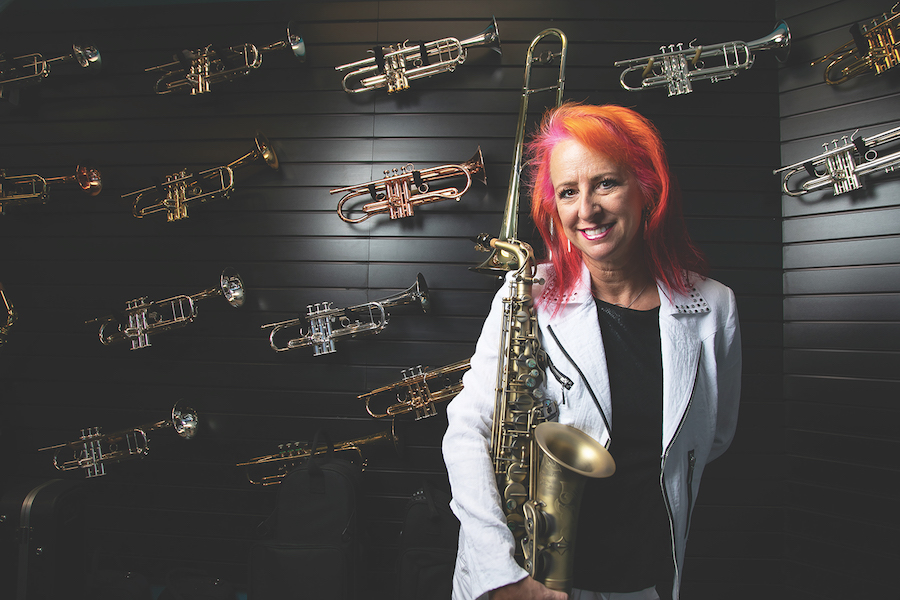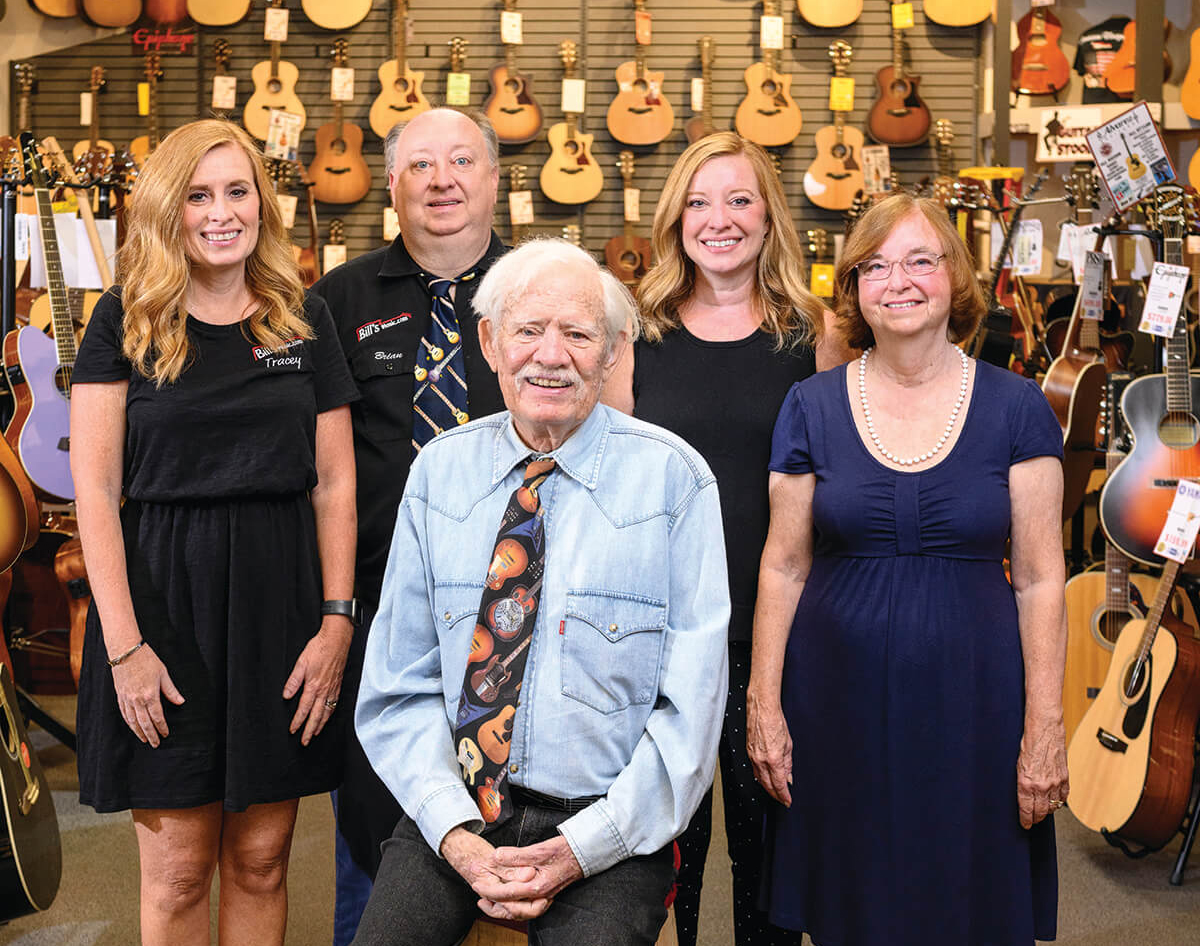
Leslie Stirm
Leslie Stirm got her start in MI the best way one can get into any business — to meet a need.
“There was a need in our town for a solid music store, and we saw that and opened one from scratch,” Stirm said. This became Instrumental Music Center in Tucson, Arizona, founded in 1999. Stirm, whose degree is in chemistry, math and physics, had previously worked in the laser industry.
“We signed a three-year lease,” she said. “It was the scariest thing I had ever done up to that point. I had no idea what the future held, but just went for it.”
Over the last 22 years, IMC has established a strong sense of itself. In speaking with Music Inc., Michael Santander, IMC’s general manager, was quick to outline exactly what IMC is, what it does and who it serves.
“Instrumental Music Center is primarily a band-and-orchestra music store,” he said. “Our job is to serve the beginning musician the best we can. What we do best is get people excited about playing music and fueling that excitement. It’s about the passion for playing music and being part of a musical community.”
Santander got his start in fast food management before moving into MI at another store 20 years ago, and starting at IMC 10 years ago. Pre-pandemic, he would gig weekly on guitar around Tucson, but he’s also a cellist, which fits well with IMC’s core identity. “I don’t think our main drive has been to really focus on the professional rock and roll musician,” he said.
The numbers bear this out. Looking at IMC’s fretted sales by category, the store sells twice as many acoustic, acoustic-electric and classical guitars versus electric, hollow-body and bass guitars. Further, in looking at IMC’s 2020 sales spread across everything it offers, rentals and band products are 75 percent of the store’s sales.
“Rentals are the bread and butter of our business,” Stirm said, and proceeded to explain how IMC has gotten so good at serving band. “We have a philosophy that we will provide the band director anything that they need,” she said. “The band director doesn’t have an open PO for burritos, but if they need burritos, we’ll go buy them burritos and put it on the open PO because that is something for the band director. We try to be as helpful and enabling as possible to keep the band directors’ lives easy and the music flowing.”
The end result is that, understandably, band directors look at IMC as a problem solver. Stirm said, “We’re one of the first ones that schools will come to and say, ‘I’ve got this problem. Help us with a solution.’”
Hard Stop
Of course, COVID-19 massively challenged band programs everywhere, something Stirm and IMC were keenly aware of and felt the effects of. “Band is a super-spreader event,” Stirm said. “Kids are spitting into instruments, so that’s about as scary as it could get.” So, not surprisingly, once the pandemic started, the store saw institutional buying decline.
“Band directors didn’t know what they didn’t know in terms of what was going to come and what was the plan,” she said. “Once the vaccines started rolling out, then people had a lot more confidence about the future, and then we started seeing more institutional buying as a result. But it’s still a dicey thing.”
IMC had been offering lessons, working with 15 to 20 teachers and 300 students, but suspended all this last year.
“There was a hard stop there,” Stirm said. “Getting it restarted up again is a challenge because we have to talk to teachers about whether they’re vaccinated or not. We have to give parents a level of security, then it starts getting into well who’s vaccinated? Who’s not? These are real personal questions that aren’t appropriate. So we’re just letting that piece of the puzzle drop at this point until we’re able to safely bring it back.”
IMC also closed a second location, as foot traffic could no longer support it. During quarantine, IMC closed its sales floor for six months and reduced its staff to just two or three people, with Stirm encouraging everyone else to file for unemployment “because the sky was falling.”
But Stirm saw this as an opportunity when the store began rebuilding 90 days later. “We hired back our best and brightest and the people that we wanted back really hard,” she said. The staff is now back up to 25 employees.
Like all stores, IMC had to quickly evolve its approach to instrument hygiene. It now quarantines all its incoming instruments for five days before disinfecting them. The store used to stage an instrument petting zoo at the Tucson Festival of Books. “We loved it — exposing hundreds and hundreds of kids to instruments, and parents and adults even showing up and playing tenor sax for their granddaughter, and she was like, ‘Oh my gosh, grandma, I didn’t know you played tenor sax!’ It was really great.” Unfortunately, this is also on hold. “We have to not do that for the next couple of years until we can figure out how to do that safely,” she said.
IMC does not enforce social distancing or wearing masks for customers in the store. “All of our staff is currently wearing masks to protect ourselves from each other, as well as whatever the public might have,” she said. “But we’re in Arizona, a pretty red state, and we don’t really want to fight that battle at the front counter. So we let people do what they want to do.”
Regardless, Stirm sees a silver lining to the pandemic as it was legitimate disruption, a term that, as she points out, has been very trendy in business publishing over the last 10 years. “It’s amazing how many retailers are struggling to go back to the way things used to be without stopping to pause and say how things should be or how things should be different or how they could be,” she said. “We’ve literally had a year’s worth of nothing. And so many people are just clamoring to go back the way it was. We’re trying to reinvent how we see ourselves and how business is done.”
Right in Your Backyard
Now, there’s a reason IMC is currently reinventing itself in a big way. Stirm used to co-own IMC with her husband, Mike Faltin. The two are currently divorcing, and in December 2020, the store was given to Stirm by a court order. “We can just say that Mike Faltin exited the scene and can leave it with that,” she said.
Once Stirm became sole owner of IMC, the first thing she wanted to do was remodel. Its look hadn’t changed since it opened in 1999. IMC’s new look started with a new logo. IMC worked with Ryan Trayte, a designer with a small studio in Tucson called Saywells Design Co. Trayte and Saywells have worked on an impressive range of projects — not just store signage, but also album covers, craft beer cans, wine bottles, coffee and spice packaging and more.
“They gave us three designs,” Stirm said. “All three were amazing. And we narrowed it down to the existing design that we went with and then just fine-tuned that.”
The remodel unfolded from there. “Once they had our new logo, it was really easy to then say, ‘Well, what else are we going to do with this?’” she said. “So at that point we tackled new flooring, new wall colors, a new sign and then just expanded that out through everything.”
But so far this was being done piecemeal. Stirm decided to turn it into an overall project, and delegate it to her GM, a chance for him to further grow into his role. “I just gave Michael Santander a budget and he works the remodel into that budget, and that allowed him to really get ownership over what was happening, as well as see how the sausage is made behind the counter, essentially,” she said. “So he was able to make a lot of decisions, with training wheels, so to speak. I was there every step of the way, but a lot of decisions fell down to him and he couldn’t make a bad decision. Any of these are good if you pick it, and he’s really grown as a leader.”
Santander explained his approach to developing IMC’s new look. “We’ve always been so much more than just a store in Tucson,” he said. “We’ve always cared about being involved in different organizations and bands and school music programs, all of these things are part of the community and we felt like that wasn’t being reflected in our branding,” he said. “We wanted to make sure that our store was very clearly a store in Tucson, Arizona, serving Tucsonians. That wasn’t being said in our colors and our image and the way our store looked or felt.”
To fix this, Santander took a wise approach — he simply looked around Tucson. “I was just searching a bunch of different options and local businesses that I liked,” he said “I kept coming across the same sort of stuff, and so I compiled a list, like, ‘Ooo, I like this and I like this and I like this.’ And when I backed up, I realized they were all the same guy.”
This was Trayte, who, it turned out, was an IMC customer. When Santander first reached out to him, he shared that he had actually bought a candle from the store the previous week. “So it was just a match made in heaven,” Santander said. “There’s national companies that do stuff, but there’s also people right in your backyard, possibly right in your customer base, that care about your store that know who you are and what you do.”
Trayte himself explained how he approached capturing IMC’s identity in its new look. “They found over the years, and they’ve been a Tucson institution for a long time, that while this city is very collaborative and supporting and recognizing of local businesses, they never really felt from the community that they were perceived as very local, because they have kind of an any-town sort of name. It’s not the Tucson Music Center. So, number one, we wanted to more directly associate our being local, and I think that came through with some of the language that we use, but then pulling a lot of inspiration from desert colors and the landscape and the sunsets here.”
Further, while Trayte and IMC wanted the new look to be fun and welcoming, they also wanted it to be authoritative. “We went into Instrumental Music Center being an authority in Tucson on the products that they sell and the instruments that they rent,” Trayte said. “It’s a reliable place to go and bring your kids and introduce them to music. We leaned into a lot of historical, fun references and it might be subtle. I love looking at old design and referencing nostalgic pieces, and we looked through a lot of ’50s, ’60s and ’70s jazz records, and I think that came through in the treatment of the logo and even the letter forms.”
Santander didn’t stop with changing the look of the store. He changed the look of the employees, in that he changed the dress code. He ran down how different stores approach this.
“It’s often pretty traditional in the industry to have a name tag or a lanyard,” he said. “And oftentimes employees get to wear whatever they want and sometimes it’s a little hard to figure out who works there from a distance.”
IMC had gotten around this problem by having its employees wear embroidered polo shirts, without tags.
Santander surveyed the staff to arrive at a new approach. “We all decided that if we all wore black, button-down shirts, whatever we wanted, any style, just solid black, button-down, collared shirts was the requirement, that you would be able to tell from a distance that somebody worked here,” he said. IMC added magnetic logo badges, without names.
Dress code aside, Santander feels customers know who works at IMC because its employees are quick to approach anyone who enters the store and introduce themselves. “Even if they’re not they’re not donning a lanyard or a name tag, they’re a real human being [who] has a conversation,” he said.
According to Santander, in this way, IMC is playing to its greatest strength. “The culture of our store is our most important asset,” he said. “It’s really important to have stock and instruments and product to sell, but the thing that we have, our competitive edge against any other business, is our staff. They’re absolutely incredible.”
Stirm echoes this in describing IMC’s approach to social media. “We celebrate people’s birthdays on social media,” she said. “We really focus a lot of energy on highlighting our biggest asset, which is our staff.” She finds posts that say, “Come buy this thing now, now, come buy this widget” to be “really boring.”
Stirm is looking into setting up an employee defense fund. “Occasionally employees make dumb mistakes and they need to come up with a lawyer and they have no way of representing themselves in a court of law without a retainer,” she said. “That’s really not doable for a lot of people.”
The Future Looks Bright
As of the remodel, IMC has expanded from the 1,500 square feet it occupied when it first started 22 years ago to 8,500 square feet today. IMC sales doubled from Q1 to Q2 of this year, then went further up a bit in Q3. Perhaps this is why Stirm is optimistic for the future.
“The sky’s the limit, really,” she said, adding that she’s considering a handful of options going forward. “We could have just a kick-ass music store in Tucson, or we could expand into all of southern Arizona, multiple stores, or I’ve even got some ideas that could possibly take on some of these national chains. I’m still excited about what’s going to happen to IMC next. It’s a little engine that could, and now it’s really ramped up. It’s like a race car.” MI











